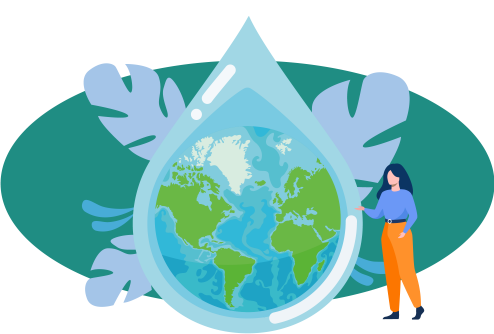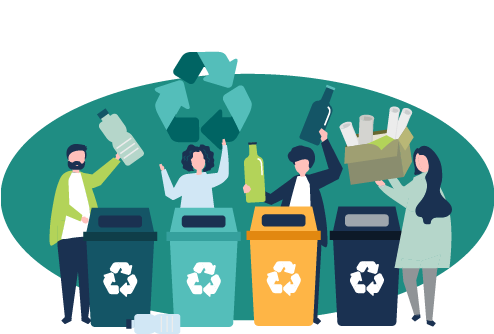- Home
- Sustainability
- Environment
- Medium/Long-term Targets for Environmental Issues
Medium/Long-term Targets for Environmental Issues

Formulating Medium/Long-term Targets for Environmental Issues
Global environmental protection is an important issue for the whole of society toward human existence and prosperity, and the most critical management issue for the Nisshin Seifun Group doing business as a member of society.
Among the five Sustainability Priorities targeted for action by the Nisshin Seifun Group, we have identified two environmental priorities—efficiently handling product and packaging waste, addressing climate change and water resource issues—as requiring prioritized efforts over a medium-to-long-term timeframe.
We will reduce our environmental impact across all of our supply chains by setting and revising these medium-to-long-term environmental targets. We will work toward these targets through highly effective initiatives, while implementing environmental protection activities.
Related pages:

Action on climate change
Details

Conserving water resources
Details

Reducing food waste
Details

Reducing packaging waste
Details
Medium/Long-term Targets and Initiatives for Environmental Issues

Action on climate change
The impact of climate change is becoming more serious year after year. This global-scale issue will have an enormous impact on society, the environment, and business across multiple generations, and there is an urgent need for a clearly defined response. Climate change affects the Nisshin Seifun Group at all stages of our supply chains by causing natural disasters that affect our operation sites and wheat-growing areas, as well as our ability to procure raw materials.
Our efforts to mitigate the impacts of climate change and minimize business risks include the reduction of our CO2 emissions through the proactive introduction of energy-saving technologies and the use of renewable energy. We will continue to contribute to the realization of a decarbonized society through these and other approaches.
- Targets for 2050
-
- Reduction of CO2 emissions from facilities owned by the Group to zero
- Reduction of CO2 emissions across our supply chains
* We will work toward our targets for 2030 through the same initiatives.
- Targets for fiscal 2030
-
- Reduction of CO2 emissions from facilities owned by the Group by 50% compared with the fiscal 2014 level
Main reduction initiatives
- Ongoing energy-saving efforts
- Utilization of renewable energy (including the proactive installation of solar power systems)
- Transition from fossil fuels to electric power or zero-carbon fuels for boilers and other facilities
- Utilization of systems based on carbon pricing, such as emissions trading
- Measurement of supply chain CO2 emissions, cooperation with suppliers

Conserving water resources
There is a risk of water shortages caused by climate change-related shifts in rainfall patterns, population growth, and other factors. The Nisshin Seifun Group conducts regular water risk evaluations in regions where we source raw materials, and at our manufacturing sites.
We will continue our efforts to reduce the amount of water used in our plants. We will also work with our partners at all stages of our supply chain to ensure effective utilization of this finite resource.
- Target for fiscal 2040
-
- Reduction of the amount of water used in plants per unit of production by 30% compared with the fiscal 2022 level
* This target applies to group companies in Japan and overseas.
We have set targets for each region based on the water supply risk level. We aim to halve the amounts of water used in regions with particularly high water risk levels.
Main reduction initiatives
- Efficient use of water through the introduction of water-saving equipment and IoT systems
- Promoting cyclic use of water within plants, including the recycling of waste water

Reducing food waste
Despite the problems of hunger and poverty, around one-third of all food produced for human consumption in the world is lost or wasted. Food losses in Japan are believed to amount to millions of tons per year. Food waste reduction and recovery through food systems in a circular economy are important steps toward the sustainable society.
We will work with our supply chain partners to reduce food waste and contribute to realizing the sustainable food systems.
- Targets for fiscal 2030
-
- Reduction of food waste, from the procurement of raw materials to the delivery of products to customers, by 50% or more compared with the fiscal 2017 level
* This target applies to group companies in Japan. The targets for Initio Foods Inc., Joyous Foods Co., Ltd., and Tokatsu Foods Co., Ltd. are relative to fiscal 2020 levels.
- We will work with our partners to reduce food waste at all supply chain stages.
The Nisshin Seifun Group defines food waste as by-products and waste products from food manufacturing and distribution processes that cannot be used in food and are processed and disposed of through thermal recycling, landfill disposal, incineration, and other means. Business-related waste and by-products used in animal feed, fertilizers and other products are not included in “food waste” because they result in sustainable recycling.
Main reduction initiatives
- Reduction of production process losses, and losses due to damage to packaging or product damage
- Reduction of food waste through the extension of shelf lives, reduction of product returns through changes to shelf life labeling
- Transition to material recycling (e.g., livestock feed, fertilizers, fermentation, reuse)

Reducing packaging waste
Plastics have low recovery and effective utilization ratios compared with metals and other materials. In addition, there is a threat of environmental contamination on a global scale, since current estimates indicate that millions of tons of plastic waste are flowing into the oceans every year due to inappropriate disposal. Effective utilization of resources and waste and the elimination of plastic pollution from the oceans will require global efforts toward the creation of sustainable systems to recycle plastic waste into resources.
The Nisshin Seifun Group will reduce the amount of fossil fuel-derived plastics used in containers and packaging. We will also contribute to plastic recycling.
- Targets for fiscal 2030
-
- Reduction of the amount of fossil fuel-derived plastics used by at least 25% compared with the fiscal 2020 level
* This target applies to group companies in Japan.
- Promotion of plastic recycling, such as through the use of environmentally-friendly designs
- Increased use of sustainable packaging materials, such as biomass plastics, recycled plastics, recycled paper, and FSC-certified paper
- Reduction of the amount of fossil fuel-derived plastics used by at least 25% compared with the fiscal 2020 level
Various types of containers and packaging are used for products manufactured by Nisshin Seifun Group. Because these materials play an important role in maintaining the quality of food products until they are fully consumed, safety and reliability will remain key requirements as we move toward the use of environmentally-friendly designs and sustainable packaging materials.
Main reduction initiatives
- Promotion of reduction/reuse/recycling (the “3Rs”) + renewables
- Use of container and packaging designs that facilitate sorting and allow material or chemical recycling







